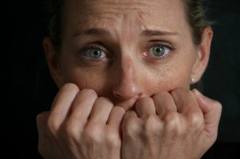The subject of menopause and anxiety is emerging as a prominent issue facing women of this age. The menopause affects women aged 40-50 and comes about when the estrogen levels in a woman’s body decreases, as ovaries prepare to release their last eggs.
Many women find that they may experience symptoms of anxiety during the stages of menopause, and also in the phase preceding, known as the perimenopause. There are many myths about menopause related anxiety, and it can be useful to dispel these myths if you, or anyone you know, is experiencing menopausal anxiety.
Although anxiety can occur at any time in a woman’s life, there are many women that find they experience heightened stress, anxiousness and nerves during the stages of the menopause. Typical symptoms of anxiety include excessive and or persistent worry, tension, nervousness, feelings of ‘rising panic’ and a loss of control. Often, people experiencing anxiety may find it difficult to concentrate, but also have difficulties relaxing, may feel tense, restless or irritable.
There are often associated physical symptoms associated with anxiety. These range from heart palpitations, aching muscles and digestive problems, through to excessive sweating, shortness of breath and fatigue. The resultant situation for someone suffering from anxiety, is a feeling of being on edge and lack of control. This can put strain on personal and professional relationships, and can often make it hard to undertake daily tasks, or even to sleep.
The menopause and anxiety is a particularly misunderstood phenomenon. Although the reduction in estrogen levels is thought to have some effect on the brain’s regulation of moods and emotion, feelings of anxiety or anxiety attacks are not directly attributable to this reduction in estrogen in the body. The real cause of feelings of anxiety is thought to be more of a replication of previous events. For example, if you have a hot flash in a crowded place, you begin to associate the feeling of anxiety with the circumstances you found yourself in, i.e. the crowded place. The next time you find yourself in a similar or associated situation, you may find that you begin to feel anxious again. It is the association of a place, thing or feeling, with anxiety that allows for the perpetuation of that anxious feeling, not the reduction of a hormone in the body. Therefore, treatments for menopause related anxiety have in recent years attempted to solve the problem of the anxiety itself, rather than the lowering of estrogen in the body.
Controlling menopause related anxiety is accomplished by focussing on achieving a general feeling of calm in oneself and ones life. This might not sound a very robust way to reduce anxiety, but is actually a very successful method. A focus on daily methods of relaxation can be extremely useful – for instance, yoga and meditation can allow a woman to gain a feeling of control through calm and focus. Increasing the amount of physical exercise undertaken can contribute to a better night’s sleep, resulting in feeling refreshed and ready to go the next day, instead of a nervous or on edge. Reducing the amount of alcohol and caffeine that consumed can reduce dehydration.
Managing symptoms associated with the menopause and anxiety can be achieved through eating well undertaking a good level of exercise and maintaining a happy mind.
